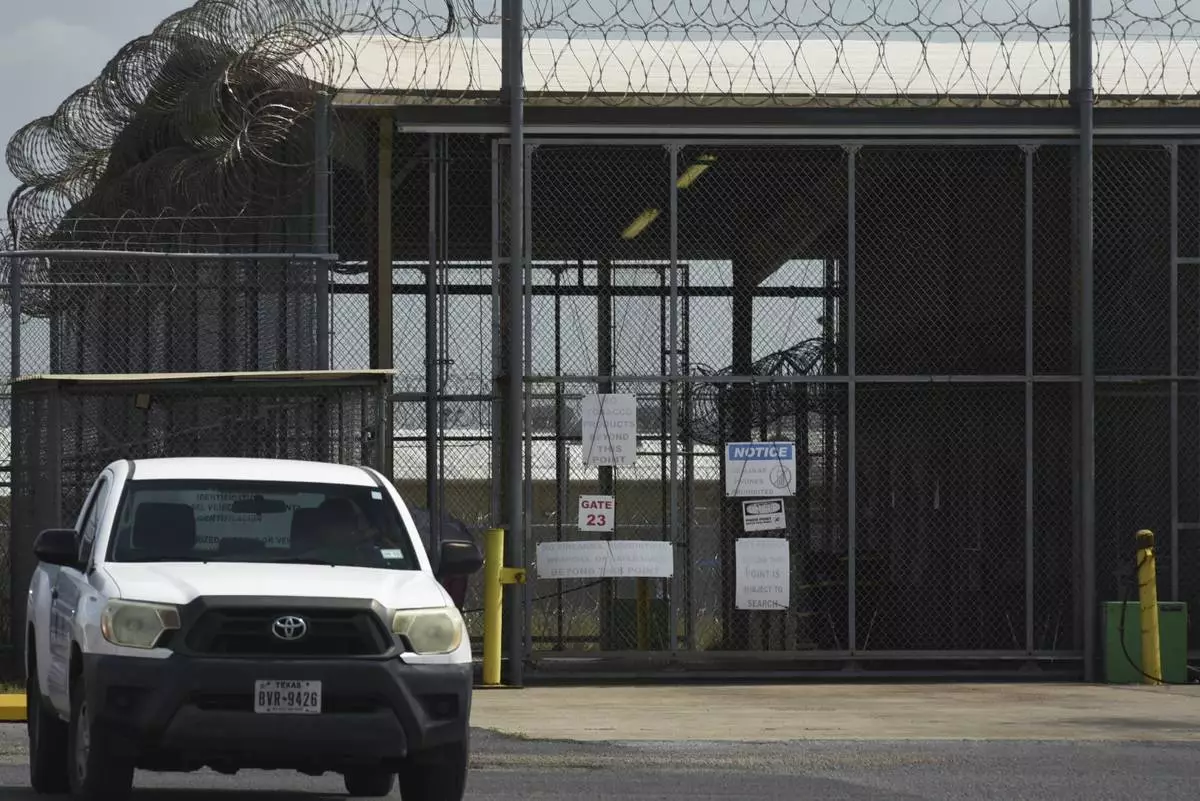WASHINGTON (AP) — Republicans narrowly got their budget plan over the finish line. Now comes the hard part.
The resolution adopted this week was only a first step that allows Republicans to draft legislation that they can push through Congress without Democratic support. Next, they begin crafting a final bill with enough spending cuts to satisfy those on the right while not jeopardizing the reelection prospects of more vulnerable lawmakers whose constituents rely on key safety net programs.
With thin majorities in the House and the Senate, Republicans can afford to lose hardly any votes from their side of the aisle as they draft legislation, giving each lawmaker leverage over the process.
“It's going to take all of us to get it done,” said House Majority Leader Steve Scalise, R-La.
The road ahead is daunting.
Republicans are determined to extend the individual tax cuts that were approved during President Donald Trump's first term before they expire at year's end. But they intend for the legislation to do far more than that, potentially enacting a host of tax reductions that Trump promised during the campaign, such as no income tax on tips and overtime.
And the tax cuts are only half the equation. Conservatives in the House gave the budget plan the final votes needed for passage Thursday after they said they received assurances from leadership in both chambers that they would work to have a final product with at least $1.5 trillion in spending cuts — forcing changes to federal programs including Medicaid that could prove hard for some in the party to support.
“The struggles Republicans have faced so far are only a glimmer of what’s to come,” said Senate Democratic leader Chuck Schumer.
Rep. Max Miller, R-Ohio, senses a difficult fight for Republicans. He said Trump has made clear he doesn't want any benefit cuts for those who get health insurance coverage through Medicaid, which could conflict with the desire some conservatives have for steep spending cuts.
“If it’s this rocky now, it’s only going to get worse from here on out if the speaker is not able to get the entire conference in line,” Miller said.
Democrats have framed the debate as Republicans looking to slash key government programs so they can pass tax cuts that predominately help wealthier households. It's a message Democrats will hammer home leading up to the 2026 midterm elections.
“At this point, they’re all worried about primaries and they are worried about Elon’s money, but they ought to be worried about a general election as well," said Rep. Jim McGovern, D-Mass., referring to Trump's billionaire ally and adviser, Elon Musk. “I think it’s going to be very difficult for a moderate Republican, if there’s still any left, to be able to vote for this and go home and defend it."
Some Republicans also made clear to GOP leadership before Thursday's budget vote that they will be closely monitoring the changes to Medicaid in the final bill.
“This was just making sure that there is a clear understanding here that there are a group of members that will not cut benefits from seniors and our most vulnerable New Yorkers who rely on Medicaid," said Rep. Nicole Malliotakis, R-N.Y.
Sen. Susan Collins, R-Maine, who is up for reelection next year, said she's also made her position known to leadership.
“I could not make my position on Medicaid cuts clearer," she said. "I am not going to support cuts that affect low-income families, disabled individuals, low-income seniors, rural hospitals.”
Republicans say their focus is on instilling work requirements for able-bodied beneficiaries and more rigorous eligibility assessments. But Democrats say Republicans can't generate the savings being discussed without also cutting benefits.
Meanwhile, Republicans see extending the individual and estate tax cuts passed in Trump's first term as key to their electoral success next year. The House Ways and Means Committee says a family of four making $80,610 a year, the median income in the United States, would see a $1,695 tax increase if the tax cuts are not extended.
Republicans spent the last few years blaming President Joe Biden's administration for increasing the debt, and a key test will be how many keep that focus as they seek to extend and expand tax cuts.
A recent estimate from the Joint Committee on Taxation projects that extending the 2017 tax breaks will add $5.5 trillion over the next decade when including interest, and $4.6 trillion not including interest. On top of that, adding Trump’s campaign promises would swell the price tag to $7 trillion.
Sen. Lindsey Graham, R-S.C., said he'll advocate for splitting the measure into two reconciliation bills if Republicans take too long to get to a final product.
“I’m going to say break it apart, because they need money for the border yesterday and they also need money for DoD,” Graham said, referring to the Department of Defense.
House Speaker Mike Johnson said he looked forward to the challenge and there was a lot of work ahead.
“The American people are counting on us,” Johnson said.
Rep. Tom Cole, R-Okla., said he's confident a final bill will pass with the House winning the most important tussles on the scope of taxes and spending cuts.
“I will bet you they will fold rather than inflict the largest tax increase in American history on their voters,” Cole said of the Senate. “And two-thirds of them, with all due respect, aren’t on the ballot next time. ... Whereas everyone here is on the line. And our majority is much more on the line that their majority is."
——
Associated Press staff writers Mary Clare Jalonick, Lisa Mascaro and Stephen Groves contributed to this report.

Speaker of the House Mike Johnson, R-La., talks to reporters just after House Republicans narrowly approved their budget framework, at the Capitol in Washington, Thursday, April 10, 2025. (AP Photo/J. Scott Applewhite)

House Majority Leader Steve Scalise, R-La., talks to reporters just after House Republicans narrowly approved their budget framework, at the Capitol in Washington, Thursday, April 10, 2025. (AP Photo/J. Scott Applewhite)

Speaker of the House Mike Johnson, R-La., left, and Senate Majority Leader John Thune, R-S.D., make statements to reporters ahead of vote in the House to pass a bill on President Donald Trump's top domestic priorities of spending reductions and tax breaks, at the Capitol in Washington, Thursday, April 10, 2025. (AP Photo/J. Scott Applewhite)
A federal judge on Thursday barred the Trump administration from deporting any Venezuelans from South Texas under an 18th-century wartime law and said President Donald Trump's invocation of it was “unlawful.”
U.S. District Court Judge Fernando Rodriguez Jr. is the first judge to rule that the Alien Enemies Act cannot be used against people who, the Republican administration claims, are gang members invading the United States. Rodriguez said he wouldn't interfere with the government's right to deport people in the country illegally through other means, but it could not rely on the 227-year-old law to do so.
“Neither the Court nor the parties question that the Executive Branch can direct the detention and removal of aliens who engage in criminal activity in the United States,” wrote Rodriguez, who was nominated by Trump in 2018. But, the judge said, "the President’s invocation of the AEA through the Proclamation exceeds the scope of the statute and is contrary to the plain, ordinary meaning of the statute’s terms.”
In March, Trump issued a proclamation claiming that the Venezuelan gang Tren de Aragua was invading the U.S. He said he had special powers to deport immigrants, identified by his administration as gang members, without the usual court proceedings.
"The Court concludes that the President’s invocation of the AEA through the Proclamation exceeds the scope of the statute and, as a result, is unlawful,” Rodriguez wrote.
In an interview on Fox News, Vice President JD Vance said the administration will be “aggressively appealing” the ruling and others that hem in the president's deportation power.
“The judge doesn’t make that determination, whether the Alien Enemies Act can be deployed,” Vance said. “I think the president of the United States is the one who determines whether this country is being invaded.”
The chair of the Congressional Hispanic Caucus, Rep. Adriano Espaillat, D-N.Y., said in a statement the judge had made clear “what we all knew to be true: The Trump administration illegally used the Alien Enemies Act to deport people without due process.”
The Alien Enemies Act has only been used three times before in U.S. history, most recently during World War II, when it was cited to intern Japanese-Americans.
The proclamation triggered a flurry of litigation as the administration tried to ship migrants it claimed were gang members to a notorious prison in El Salvador.
Rodriguez’s ruling is significant because it is the first formal permanent injunction against the administration using the AEA and contends the president is misusing the law. "Congress never meant for this law to be used in this manner,” said Lee Gelernt, the ACLU lawyer who argued the case, in response to the ruling.
Rodriguez agreed, noting that the provision has only been used during the two World Wars and the War of 1812. Trump claimed Tren de Aragua was acting at the behest of the Venezuelan government, but Rodriguez found that the activities the administration accused it of did not amount to an invasion or “predatory incursion,” as the statute requires.
“The Proclamation makes no reference to and in no manner suggests that a threat exists of an organized, armed group of individuals entering the United States at the direction of Venezuela to conquer the country or assume control over a portion of the nation,” Rodriguez wrote. “Thus, the Proclamation’s language cannot be read as describing conduct that falls within the meaning of ‘invasion’ for purposes of the AEA.”
If the administration appeals, it would go first to the New Orleans-based 5th U.S. Circuit Court of Appeals. That is among the nation’s most conservative appeals courts and it also has ruled against what it saw as overreach on immigration matters by both the Obama and Biden administrations. In those cases, Democratic administrations had sought to make it easier for immigrants to remain in the U.S.
The administration, as it has in other cases challenging its expansive view of presidential power, could turn to appellate courts, including the U.S. Supreme Court, in the form of an emergency motion for a stay pending an appeal.
The Supreme Court already has weighed in once on the issue of deportations under the AEA. The justices held that migrants alleged to be gang members must be given “reasonable time” to contest their removal from the country. The court has not specified the length of time.
It’s possible that the losing side in the 5th Circuit would file an emergency appeal with the justices that also would ask them to short-circuit lower court action in favor of a definitive ruling from the nation’s highest court. Such a decision likely would be months away, at least.
The Texas case is just one piece of a tangle of litigation sparked by Trump's proclamation.
The ACLU initially filed suit in the nation's capital to block deportations. U.S. District Judge James E. Boasberg issued a temporary hold on removals and ordered the administration turn around planes that had left with detainees headed to El Salvador, a directive that was apparently ignored. Later, the Supreme Court weighed in.
The justices stepped in again late last month with an unusual postmidnight order halting deportations from North Texas, where the ACLU contended the administration was preparing for another round of flights to El Salvador.
Riccardi reported from Denver. Associated Press writers Lindsay Whitehurst and Mark Sherman contributed to this report.

The El Valle Detention Center in Raymondville, Texas is pictured, Thursday, May 1, 2025, after a federal judge in the district barred the Trump administration from deporting any Venezuelans at the south Texas detention center under the Alien Enemies Act, an 18th-century wartime law. (AP Photo/Valerie Gonzalez)

Detainees held at El Valle Detention Center in Raymondville, Texas are seen outside briefly, Thursday, May 1, 2025, after a federal judge in the district barred the Trump administration from deporting any Venezuelans from South Texas under the Alien Enemies Act, an 18th-century wartime law. (AP Photo/Valerie Gonzalez)

The El Valle Detention Center in Raymondville, Texas is pictured, Thursday, May 1, 2025, after a federal judge in the district barred the Trump administration from deporting any Venezuelans at the south Texas detention center under the Alien Enemies Act, an 18th-century wartime law. (AP Photo/Valerie Gonzalez)

The El Valle Detention Center in Raymondville, Texas is pictured, Thursday, May 1, 2025, after a federal judge in the district barred the Trump administration from deporting any Venezuelans at the south Texas detention center under the Alien Enemies Act, an 18th-century wartime law. (AP Photo/Valerie Gonzalez)

President Donald Trump arrives to speak during a National Day of Prayer event in the Rose Garden of the White House, Thursday, May 1, 2025, in Washington. (AP Photo/Evan Vucci)



























































